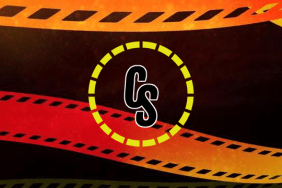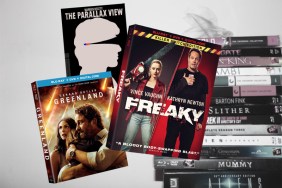
I have had my introduction to the films of Samuel Fuller… and I want more. However, the wanting I’m experiencing has little to do with the films on Criterion’s two recently released Blu-rays for Fuller’s Shock Corridor and The Naked Kiss as much as it has to do with the selection of special features available on these two discs. Limited as they may be, the selection of interviews, short films and documentaries available across these two discs paint the picture of an artist of a bygone era. As director Wim Wenders (Paris, Texas) says in one of them (from a 1983 interview), “The B-picture is finished. For ten, fifteen years already. It doesn’t exist anymore, and Sam’s whole work was inside that genre. Sam never made a film that took more than four weeks to shoot and cost more than a million-and-a-half.”
I’ve chosen to review these two releases together because that’s where they belong and Criterion has done their best to make it so, which makes me wonder why they didn’t just go ahead and box them together.
Shock Corridor was released in 1963 and centers on a Pulitzer Prize-seeking journalist (Peter Breck) who fakes his way into being committed into a mental hospital in an attempt to solve a murder. Knowing Fuller directs B movies and given that set up you’ve probably already figured out where things go from there, but it’s the execution that sets this film apart and is part of the reason it was inducted into the National Film Registry in 1996.
Among other things, one of the reasons I found enjoyment in it came while one of the hospital’s doctors was taking Breck’s character for a tour of the hospital and says, “I used to work in the female wing, but the nympho ward got too dangerous for me.” I nearly did a spit take and had to rewind it and toss on the subtitles just to be sure I heard it correctly. Sure enough, I did, and believe me those “nymphos” don’t limit their appearance, they are a group of rather intense ladies… and that’s putting it mildly.
The Naked Kiss was released a year later starring Constance Towers as a prostitute intent on changing her ways when she takes up residence in a seemingly innocent small town, but it isn’t long before she realizes there’s a seedy underbelly to the buttoned-down facade. Towers also has a role in Shock Corridor, but here the film is all hers, but like Shock Corridor this one too goes down some dark passages.
Each Blu-ray release looks impressive from top to bottom. The black-and-white picture on both films is stunning as well as the infrequent color moments in Shock Corridor. Additionally, the audio on each is stellar, most notably on Shock Corridor during the film’s most impressive moment, a hallucinatory rain storm that not only sounds impressive has one amazing upside-down-can’t-tell-what-direction-the-rain-is-falling shot that really stands out. Fuller fans and any one looking to invest in these titles have nothing to worry about when it comes to the technical presentation.
Both Shock Corridor and The Naked Kiss have been released by Criterion in the past. In fact, these two films are spine numbers 18 and 19 in the collection having first been released back in 1998. Along with the Blu-ray releases, Criterion is issuing newly released DVD versions as well with the updated features.
New to both the Blu-ray and DVD releases is a nearly hour-long interview with Constance Towers with film historian and filmmaker Charles Dennis, which was filmed in 2007. The interview is cut into two 29-minute segments and split across the two discs relative to the content of the discussion. Towers is open to discuss most anything, even the controversial wig removal that opens The Naked Kiss. Fuller apparently alleged Towers had actually shaved her head for the film, but she corrects that rumor. She also confirms The Naked Kiss was filmed in ten days, a fact that doesn’t seem so far fetched the deeper you get into the special features.
Shock Corridor comes with one additional feature, that being the 1996 short film directed by Adam Simon (co-writer of The Haunting in Connecticut) called “The Typewriter, the Riffle and the Movie Camera”. This 56-minute documentary focuses squarely on Fuller, but the most exciting aspect is that it’s guided by the memories and reflections of Tim Robbins, Quentin Tarantino, Jim Jarmusch and Martin Scorsese. Once you hit play you won’t be able to stop watching. Scorsese main example of how he was inspired is a mentioning of Raging Bull, but had the interview been conducted today I’m sure Shutter Island would be the first comparison he’d make. During the press tour for Shutter Island, Scorsese was even asked about just this topic and replied:
Sam Fuller’s Shock Corridor can only be conjured as a mantra because Shock Corridor is a classic work of art. It comes for the unique experience of Sam Fuller. There is always an element of Shock Corridor hovering over [Shutter Island], but never specifically because [Shock Corridor is] in me, so it’s a part of me.

On The Naked Kiss the features are a bit more plentiful starting with an excerpt of the UK’s “The South Bank Show”, which is where the Wim Wenders quote I mentioned earlier came from. This also offers a tour of Fuller’s script collection as he offers his thoughts on war (he fought in World War II and was awarded the Bronze Star, Silver Star and the Purple Heart) as well as his thoughts on cinema in general as his ability to make his kind of movies went by the wayside and the idea of studio moguls gave way to a new corporate environment.
Next, Fuller wields his cigar and its soggy, chewed up nub, as he goes through a series of photos from his past and tells a series of stories in a 12-minute excerpt from a 1987 episode of the French television series “Cinema cinemas”.
Finally, the crème de la crème on The Naked Kiss disc is a 23-minute interview from 1967 with French television show “Cineastes de notre temps”. Here you get a concise snapshot of Fuller’s mind and his beliefs on almost everything you could possibly think of. What stuck with me the most were the following two quotes:
“Too many directors know about lenses, they know the technicality of a camera and I think that that’s crazy. They should pay no attention to it. I don’t know what lens he uses, but when I tell my man I want to shoot from here, or here, or there, whatever it is, he knows. He says okay. I use some of the best cameramen in the business.” […]
“It’s what you do with the camera that’s important, not the camera.”
Fuller made those comments in 1967, 44 years ago. What do you think he would think of the recent rise in 3D cinema, all the talk of the RED camera, etc.? It’s a fascinating glimpse into the mind of a director with a completely different philosophy from many of the major directors working today.
For the longest time I had been meaning to watch Fuller’s The Steel Helmet and just recently added The Big Red One to my Netflix queue after reading something about it, not even realizing it was a Sam Fuller film. My interest is now piqued to the point I want to explore his entire filmography. His filmmaking philosophy will have you addicted to exploring his films further and hoping Criterion continues to offer up more of his titles on the Blu-ray format.








